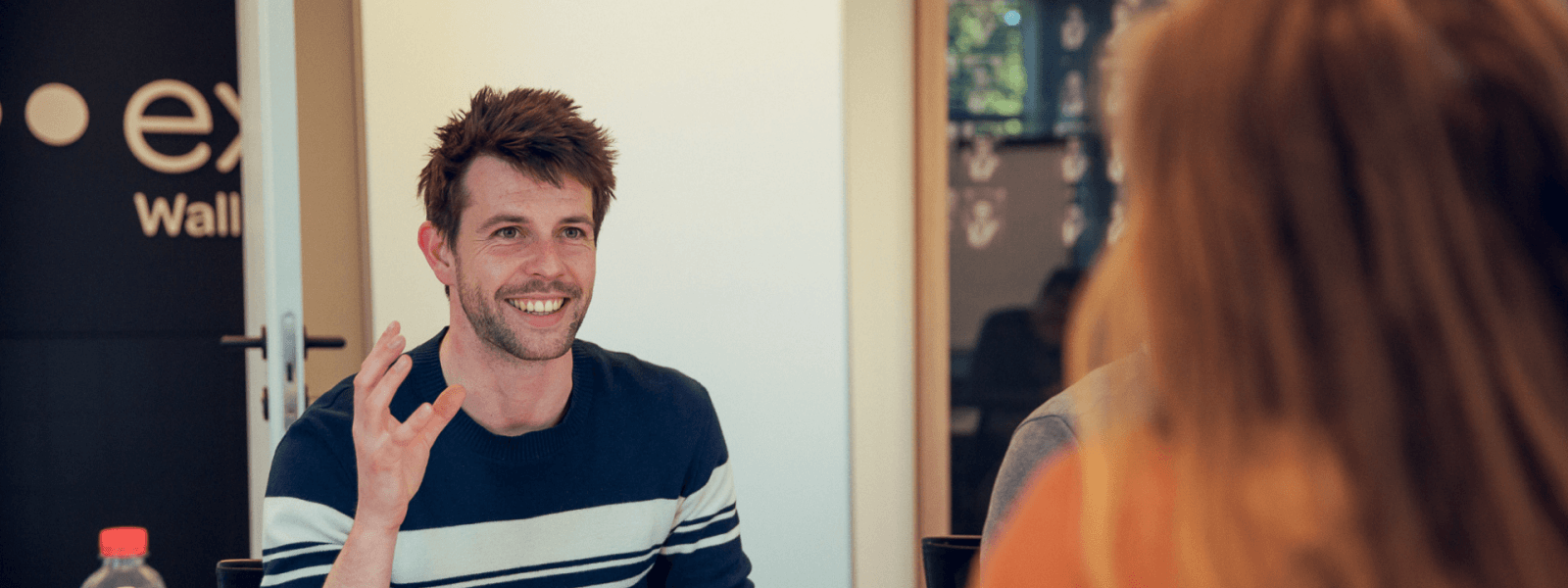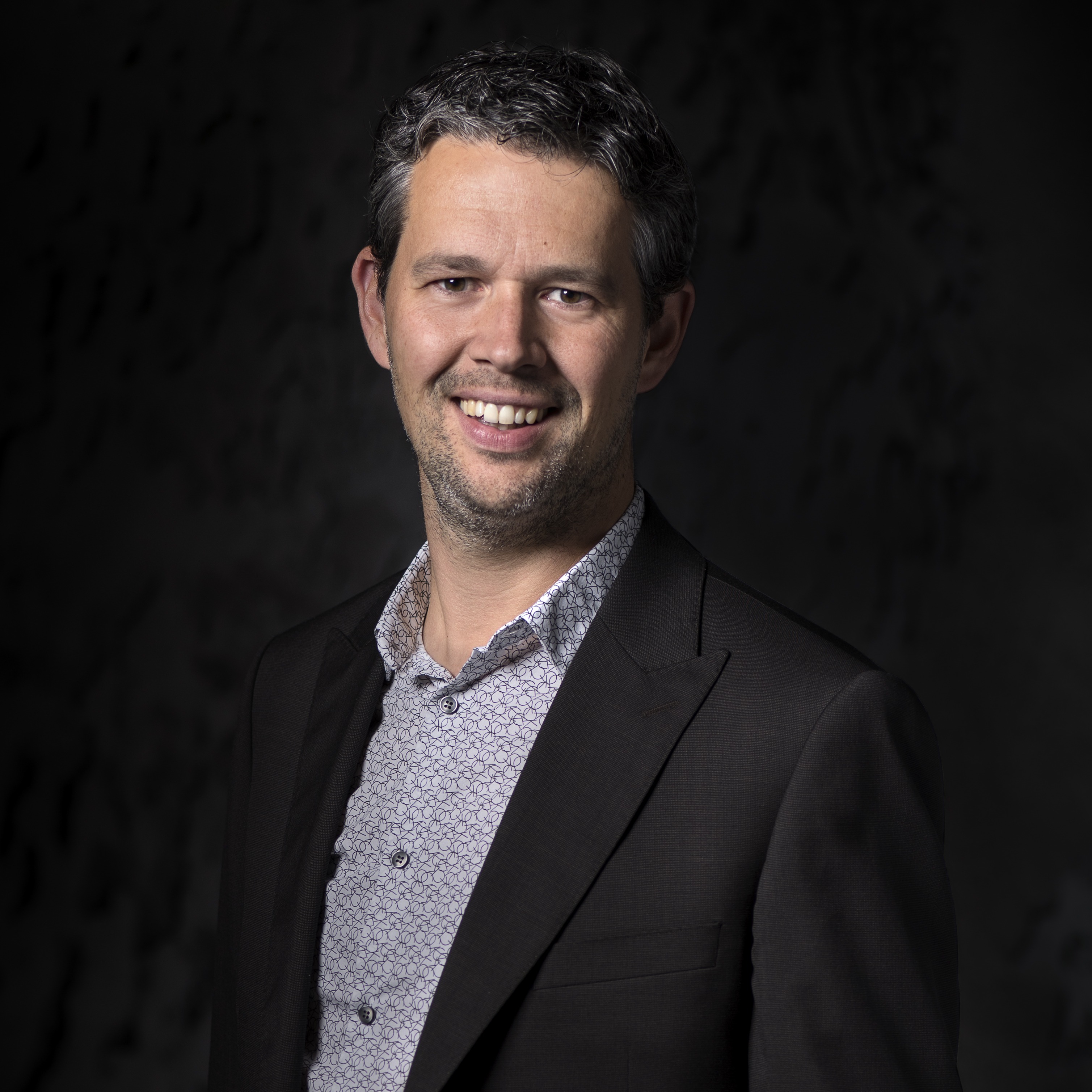How to adopt the 7 habits of highly effective people
on 27 July 2021 for ProfessionalsWe’ll give you the lowdown on this bestselling guide and show you how to adopt the principles of effectiveness.
Do you want to be more successful in life? Are looking for a way to stand out from the herd? If you’re looking for ways to improve yourself, the secret lies in adopting powerful, effective habits. In this post, we’ll show you how to do just that by following Stephen Covey’s (1932-2012) influential book, The 7 Habits of Highly Effective People.
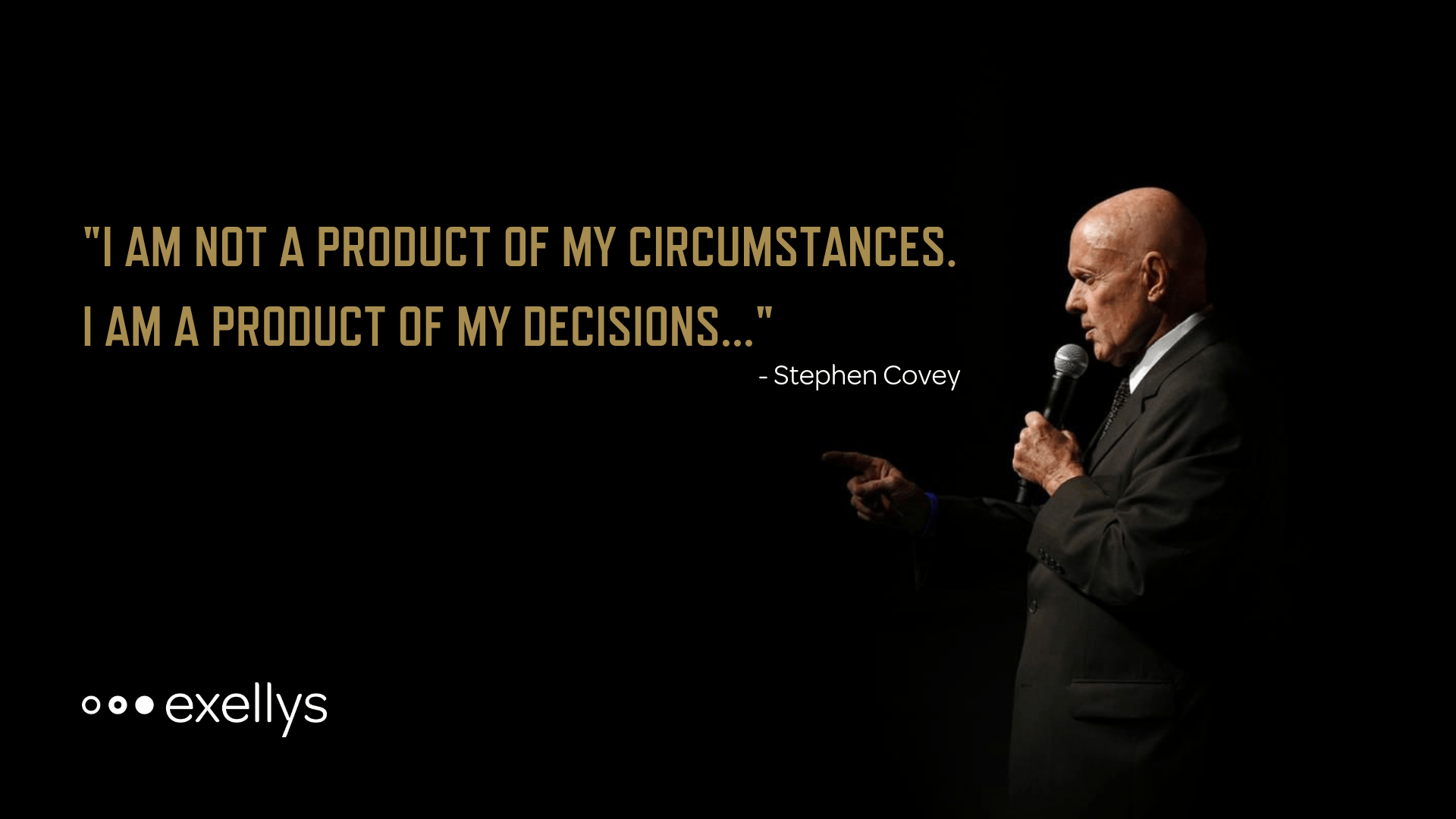
Covey’s book has sold over 20 million copies since it first went to print in 1989 and has millions of enthusiastic devotees around the world. This phenomenal guide teaches you the principles of effectiveness and shows you how to embrace them in your personal and professional life.
What’s in it for me?
At a fundamental level, we are all defined by our habits. They define what we eat, where we go, who we hang out with and how we work. Like a gravitational force, our habits can pull us in certain ways and dictate the direction our lives take.
To become more successful, you need to adopt habits that will make you more effective, both personally and professionally. Here’s how…
In a nutshell, the seven habits are:
- Being proactive
- Beginning with an end in mind
- Putting first things first
- Thinking win-win
- Seeking first to understand, then to be understood
- Synergizing
- Sharpening the saw
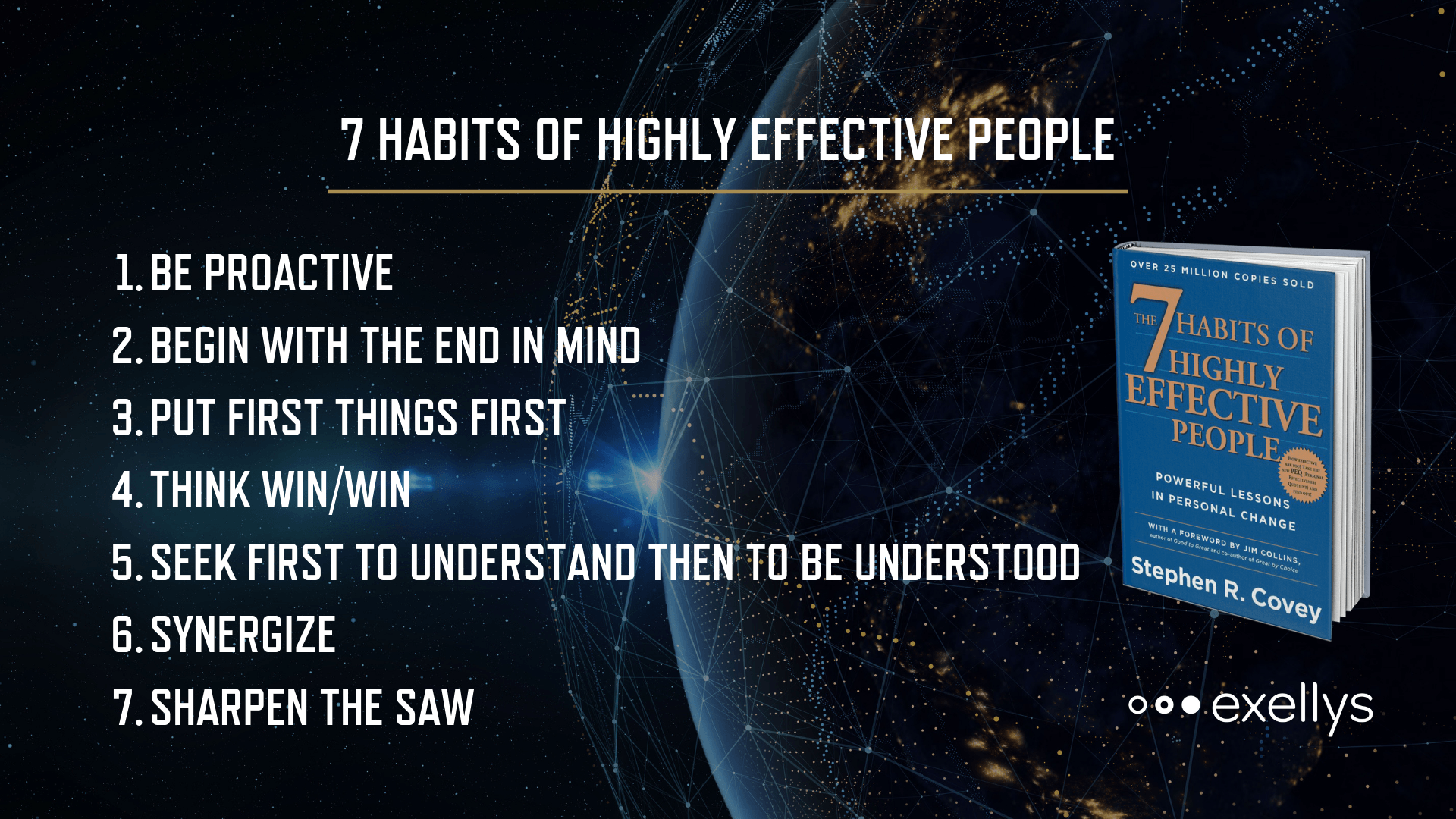
But before we discuss these seven habits in more detail, it’s important to know that there are two main guiding principles that you’ll need to embrace if you want to adopt Covey’s method of self-improvement. These are:
- Address your character, not just your behaviour.
- Embrace universal principals such as fairness and honesty.
Let’s look at these two principles and see how to adopt them.
Address your character, not just your behaviour
Stephen Covey studied over 200 years’ worth of academic literature prior to developing his seven habits for success. He noticed that historically, there have been two main approaches to self-improvement. He named these two approaches as follows:
- The personality ethic
- The character ethic
Proponents of the personality ethic held that superficial changes such as learning new types of body-language or mastering new communication techniques were the best way of changing someone’s behaviour. Covey noticed that this approach fell out of favour in the 1920s as it failed to address the fundamentals that hold people back. The personality ethic called for an ‘outside-in’ approach and rarely resulted in lasting solutions as it didn’t address peoples’ underlying problems.
Covey noticed that after the 1920s, with the likes of Benjamin Franklin and others rising to prominence, the personality ethic was replaced with another approach; the character ethic. This new approach took an ‘inside-out’ approach and held that people should work on developing their character if they wanted to see lasting change. This approach was favoured by Covey; the challenge facing him was how could people change their character?
Embrace universal principals
A key prerequisite of adopting Covey’s seven habits is learning to embrace a set of universal principals such as honesty, integrity, and fairness. These principals, Covey argues, are so widely embraced that they function as natural laws. His seven habits are drawn from an understanding that people need to embrace these principals to succeed.
Let’s dive down the rabbit hole and explore what makes Covey’s bestselling book a must-read for any aspiring titan of industry.
Habit 1. Be proactive and take control of your own fate
Think back to the last time that something didn’t go your way at work. Maybe a file was accidentally deleted. Or a deadline missed. How did you react?
According to Covey, people react in one of two ways: reactively or proactively. And how we react tells a lot about us. If you responded to the problem with a phrase such as “It’s out of my hands!”, or “It wasn’t my fault!”, you likely have a reactive mindset. If you said something like “Let’s try to find a solution…”, or “I decided to …”, then it shows you have a proactive mindset. This means that you accept that not everything is within your control and therefore focus on things you can work on.
Covey’s first habit asks’ followers to take responsibility for their mistakes and respond in a proactive way. Here’s how:
Remind yourself that the root cause of a problem is usually your reaction to it, not the problem itself. We all suffer from setbacks in life and the secret lies in how we deal with them, not in never having them. For the next month, whenever you find yourself faced with a challenge or problem, make a conscious effort to focus on finding solutions instead of blaming others.
Habit 2: Begin with the end in mind
As Covey observed, whenever people perform an action, they are actually performing it twice: First in their mind, when they imagine themselves completing the action. Secondly, when they physically do the action.
Competitive athletes are good at visualizing themselves doing something before they do it. Sprinters, for example, can envision themselves racing down the track in record time. High jumpers imagine themselves soaring into the air and pushing past their limits. But for the rest of us, this skill takes time to develop. Covey argues that it’s a skill we should all have if we want to be effective. Visualizing what we’re going to do before doing it can help improve our results.
To adopt Covey’s second habit, think about an upcoming project or piece of work and write down the results you desire. A new client? A new product or service? A promotion? Whatever it is, write it down. Be clear with your end goal and visualize yourself achieving it. Once you have practiced this with a few projects, try to implement it with your larger life goals too. Covey calls this a personal mission statement and he encourages his readers to write one and integrate it into their lives.
In his book, Covey asks his readers to undertake a simple, yet macabre, mental exercise. Imagine yourself three years in the future, having sadly passed away. Visualize your own funeral; what would your nearest and dearest say about you? How would your friend and colleagues remember you? Covey argues that most people never take the time to think how they’d like to be remembered and therefore don’t spent their time working towards goals that really matter to them.

Habit 3: Put first things first
Covey’s third habit is all about prioritization. We all face endless demands and hassles during our daily lives, so how can we prioritize the goals that really matter? Fortunately, Covey offers a simple, yet powerful, solution that anyone can use to figure out which goals they should put first: Draw a two by two matrix with four quadrants. Write ‘Urgent’ and ‘Not urgent’ next to the two boxes in the X-axis and ‘Important’ and ‘Unimportant’ next to the two boxes in the Y-axis. This grid can then be used to prioritize every task you need to accomplish.
Let’s get to it. In the first quadrant, you’ll write down all your tasks that are both ‘Urgent’ and ‘Important’, such as meeting a work deadline, preparing for an interview or writing your foundational document.
In the second quadrant, you’ll write down tasks that are important but not necessarily urgent, such as building strong relationships or networking.
Quadrant three is for tasks that are urgent but not important in terms of meeting your long-term goals, such as clearing out your email inbox.
Quadrant four is for tasks that are neither urgent nor important.
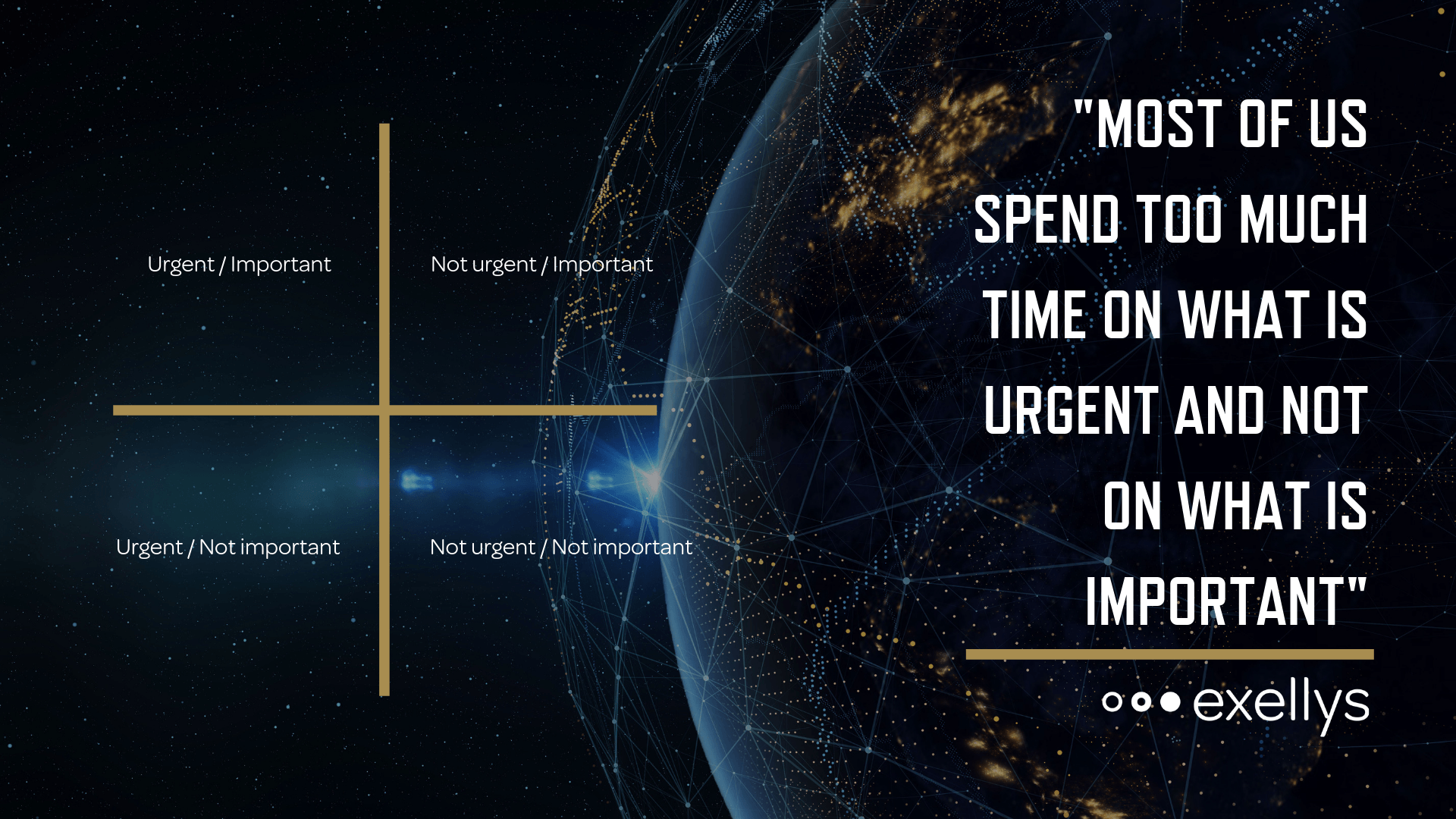
Methodically going through all your tasks and writing them into this matrix will help you sort out your most important, urgent tasks from the ones that are a pure waste of time. Covey recommends that you do this activity at least once per week and cites it as one of the most important habits for developing an effective mindset.
Habit 4: Think “win-win”
When you have an argument with someone, what outcome do you usually seek? If you’re a winner, your world view is likely shaped by a ‘win-lose’ paradigm. You see life as a zero-sum game where one person has to lose for the other person to win. You probably see life as a competition where there isn’t enough pie for everyone, so you’re in an eternal battle for the largest possible slice of what’s on offer. But Covey argues that things don’t necessarily need to be this way. He notes that ‘win-lose’ confrontations can often result in both sides losing.
For example; A hard-won financial settlement in a court case may be swallowed up by exorbitant legal fees or A company that increases its prices too steeply may find its customers voting with their feet and taking their business elsewhere. Covey pushes his readers to adopt a ‘win-win’ mindset by putting yourself in someone else’s shoes.
Covey’s fourth habit isn’t just about business deals; it applies to personal relationships too. Developing a relationship with someone is, Covey says, like fostering an ‘emotional bank account’; you put in time, effort and friendship and benefit from the increased level of trust with that person. He urges his readers to make the fourth habit a part of their lives by trying to put themselves in someone else’s shoes.
Think about an important relationship you have with someone in your life. It could be a business partner, a colleague, or even your spouse. Choose a conflict, or potential conflict, and try to see the situation from their perspective; what would constitute a ‘win’ for them? What would count as a ‘win’ for you? This approach, Covey says, will help you discover a mutually satisfactory agreement where both you and the other person can win something, without the relationship breaking down and both of you being left with nothing.
Habit 5: Seek first to understand, then to be understood
Think back to the last time you visited your doctor. They likely invited you into their office. They listened to you speak. Then they decided on a course of action such as prescribing a certain medication or referring you for further treatment. Now imagine how you would have felt if they just nonchalantly handed you a prescription before you’d even taken your seat. How would you feel?
Covey points out that this second scenario is exactly how most people act when they listen to other people. They listen simply to provide an answer, instead of listening to really understand. To adopt the fifth habit, Covey asks his readers to try empathetic listening; trying to get inside another person’s way of thinking and understand them intellectually and emotionally.
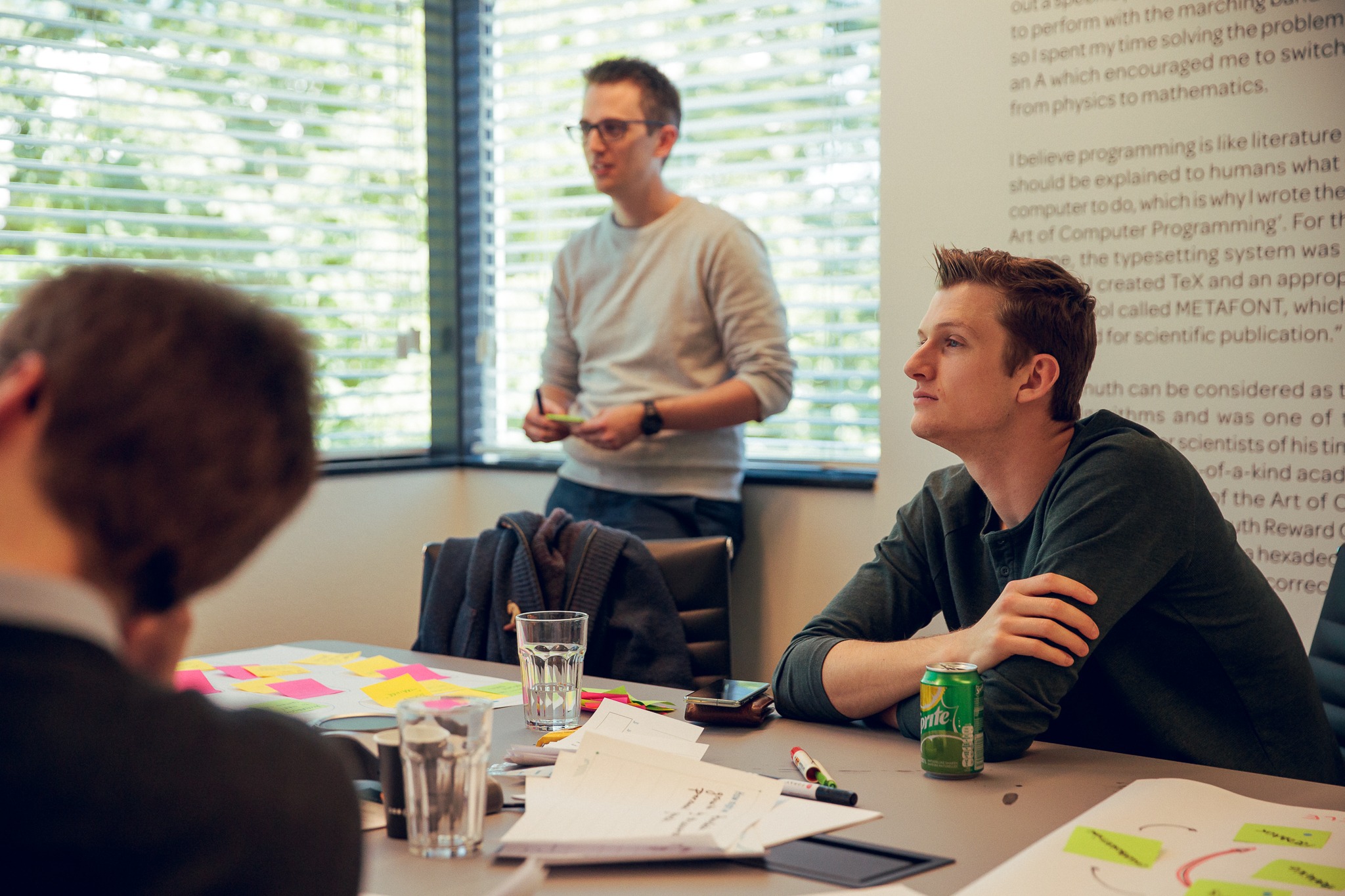
To develop your empathetic listening skills, Covey advises people to try this; observe and study a conversation without being able to hear the words. He points out that body language accounts over 60 percent of communication while the actual words we say account for just 10 percent. It could be a real-life conversation you see two people having that is out of earshot. Or, you could find an example of a conversation on a television show and watch it with the volume turned off.
Focus on what you see. What emotions can you identify? What are the people saying with their body language? If you tried this exercise with a TV show, you can try watching the segment back with the sound on and seeing how much you were able to pick up.
Habit 6: Synergize by treating others with openness and respect
Covey’s sixth habit calls on you to put everything together and ‘synergize’. To support this idea, Covey references the true story of David Lilienthal was the head of the Atomic Energy Commission after World War II. Tasked with managing a group of highly opinionated experts, Lilienthal pencilled in several weeks of time for the group to get to know each other. He encouraged them to share their dreams, fears and hopes with each other.
Although this approach was met with fierce criticism from the participants for being a waste of time, it resulted in the group developing what Lilienthal termed a ‘synergistic mindset’. The group worked much more constructively following the bonding experience and their productivity levels rose.
Synergizing with others means:
- Trying listening to other people
- Putting yourself in other peoples’ shoes
- Use the contributions of others’ as a springboard to something great
To implement this habit, Covey asks his readers to list people that they having difficulty discussing things with. He challenges his readers to think about their views and find ways that they can find synergies between their views and the views of the other people. This exercise will help strengthen your ability to synergize with others and accept their point of view.
Habit 7: ‘Sharpen the saw’ if you want to keep sawing
Covey’s seventh habit is all about self-help and self-care. He identifies four key dimensions in everyone’s life;
- Social and emotional health
- Mentally health
- Spiritual health
- Physical health
In Covey’s terminology, “sharpening your saw” means taking care of each of these areas of your life. So, how does he propose you do this?
To work on your social and emotional health, focus on building positive relationships with others and working on projects that help improve their lives. It could be helping to take on a new intern at work or joining a local charity project.
To maintain your mental health, Covey recommends that people should read plenty of good books (or blogs) and try writing their own diary, poetry or letters.
In Covey’s view, maintaining spiritual health isn’t necessarily about religion. It could mean praying for some people, but it could also mean meditating, or simply reflecting on various norms and values.
Lastly, Covey encourages his readers to eat healthily and get regular exercise to boost their physical health.

Conclusion
We’ve condensed a rather large book into its bare bones and highlighted the essence of Covey’s seven habits of highly effective people. The key message of the book is that adopting the right habits will lead to lasting effectiveness. We strongly encourage you to read the full book and be proactive about developing these habits for yourself. If you’re looking for a framework that helps you take responsibility for your life and take charge of your circumstances, Covey’s 7 Habits of Highly Effective People is well worth a read!
Do you want to become a better or more effective version of your professional self? Because we can definitely help you there. How? Find out right here.
Tags: book , career , personal growth